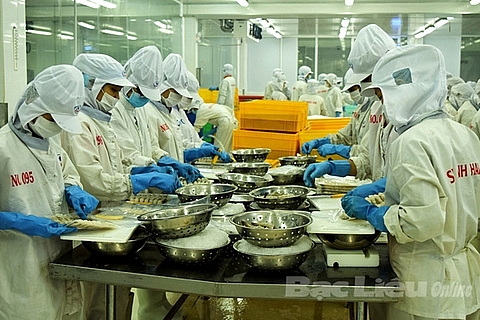Vietnam farm, fishery firms aim to lift Japan trade
 |
| Vietnamese companies, especially those in the Cuu Long (Mekong) Delta, should participate in trade promotion programmes if they want to expand exports to Japan, according to the Vietnam Trade Promotion Agency (Vietrade). |
Speaking at a seminar on promoting exports of farm produce and aquatic and fisheries products to Japan in Can Tho city on Friday, Nguyen Manh Hung, head of Vietrade’s international relations department, said bilateral trade rose sharply last year and again this year to top US$20.93 billion in the first seven months.
Viet Nam’s main exports to Japan included garment and textile, vehicles and spare parts, machinery and equipment, fisheries products, wooden products, footwear, and fruits and vegetables.
Hung said exports of agricultural and fisheries products faced difficulties.
Vietnam exports only three fruits to Japan, banana, mango and dragon fruit, according to Hung.
To qualify to enter the market, besides meeting quality standards, the fruits must undergo a hot steam treatment process to avoid insect infiltration.
Aquatic products must meet strict food safety requirements.
Dang Van Thai, director of Artex Gobelins Company in HCM City, who has more than 10 years’ experience in exporting to Japan, said “Any kind of farm produce that is unique and remains unmodified sells well in Japan”.
“When I went here, I noticed that Japanese are very fond of jasmine rice, which is grown in both Viet Nam and Cambodia. In supermarkets in Japan, jasmine rice is sold at very high prices.”
Hung said to increase exports to Japan, Vietnamese firms would need to better promote their brands as well as the advantages their products offer in that market.
They should be more dynamic in participating in trade fairs and trade promotion programmes in that country so that consumers there could lay their hands on their products.
Every year his agency sends business delegations to trade fairs and business matching events in Japan, and soon it would co-ordinate with the Can Tho Exhibition Fair and Trade - Investment Promotion Centre to identify enterprises for that purpose.
This way, more Vietnamese agricultural products would penetrate the Japanese market in the near future, he said.
Vietnam has two free trade agreements with Japan, the ASEAN-Japan Comprehensive Economic Partnership and the Vietnam-Japan Economic Partnership Agreement, under which thousands of goods are exempt from tariffs.
What the stars mean:
★ Poor ★ ★ Promising ★★★ Good ★★★★ Very good ★★★★★ Exceptional
Related Contents
Latest News
More News
- Digital economy takes centre stage in Vietnam’s new growth model (January 28, 2026 | 11:43)
- EU Council president to visit Vietnam amid partnership upgrade (January 28, 2026 | 11:00)
- Vietnam entering a new growth phase in 2026 (January 28, 2026 | 10:02)
- VIMC targets higher profit and throughput in 2026 (January 26, 2026 | 19:00)
- GEVA a launchpad for Vietnam’s agricultural exports (January 26, 2026 | 12:03)
- Data-driven risk management signals major shift in customs administration (January 24, 2026 | 11:22)
- Cosmetics rules set for overhaul under draft decree (January 24, 2026 | 11:21)
- Vietnam Airlines seeks aircraft through dry lease (January 22, 2026 | 20:43)
- Policy obstacles being addressed in drug licensing and renewal (January 22, 2026 | 20:17)
- Vietnam’s wood exports surpass $17 billion (January 22, 2026 | 20:15)

 Tag:
Tag:





















 Mobile Version
Mobile Version